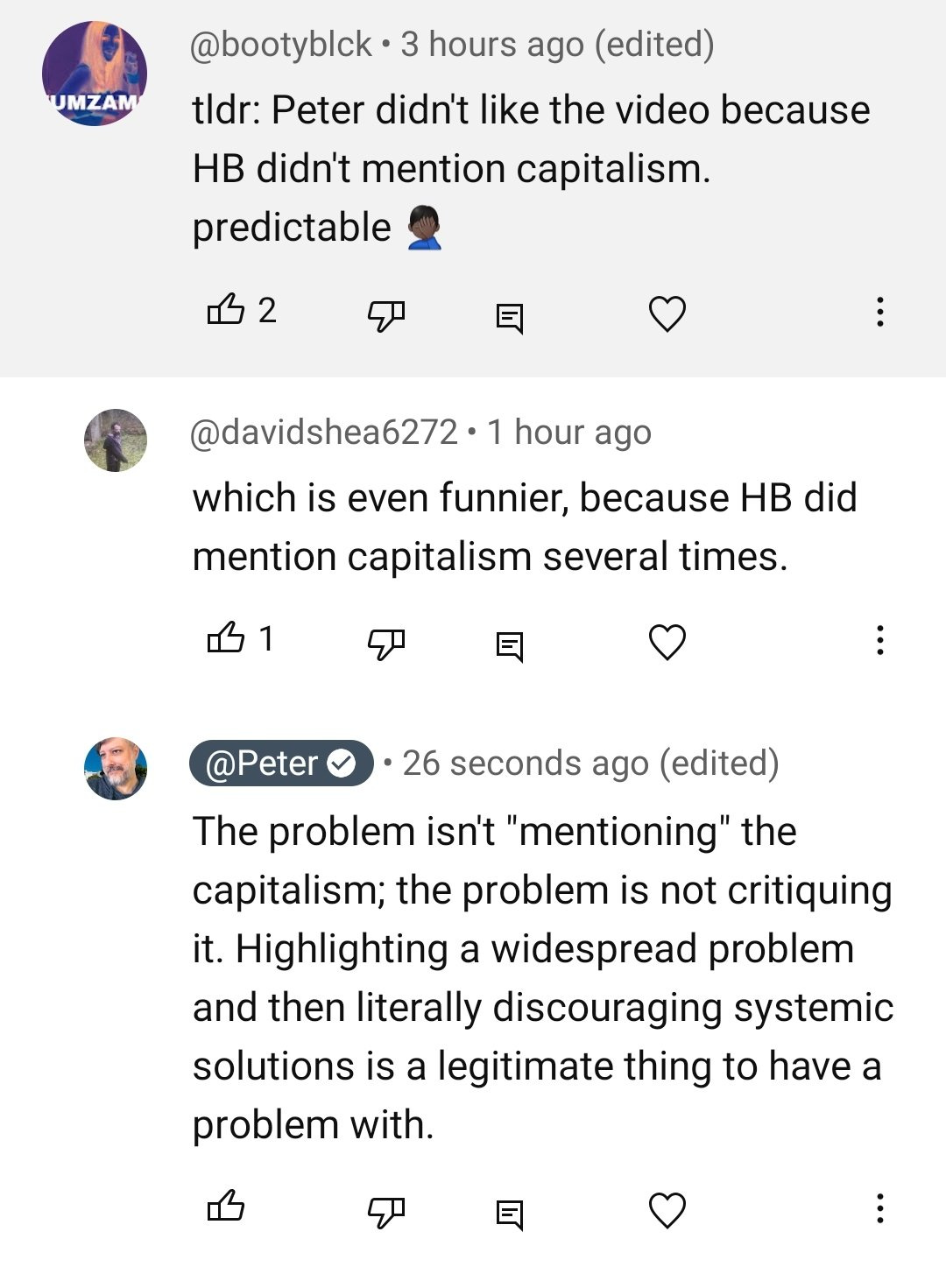Plagiarism: Addressing Systems or Individuals?
Intellectual property law and capitalism shape our views. Morality is a result, not a cause.
Big YouTubers are calling out plagiarism! Identifying the baddies in content theft is the new hotness! Let’s form online squads of non-police to punish individual creators – after all, it’s hurting the queer creators.
However, is there more to it than legal breaches and moral transgressions? What underpins plagiarism? Why do people do it? Recently, YouTuber Hbomberguy put out a four-hour video citing numerous examples of plagiarism and providing a basis for individuals to be the target while changing nothing about systems. We’ll talk about that in detail momentarily.
I also put out a video called Plagiarism is AWESOME, And Here’s Why (the title is obviously a joke; it’s not actually awesome) criticizing the total lack of addressing systemic considerations (in fact, explicitly discouraging systemic solutions) in this amount of time. I want to discuss similar points here but also expand the scope to include the effect of Hbomb’s video and the witch hunt it has created.
Individualism
In Plagiarism and You(Tube), Hbomberguy’s four-hour video about YouTube plagiarists, he tackles the issue with a slew of examples. His narrative, while engaging (and at times rather funny), frames plagiarism as a mere lapse in individual ethics brought on by a need to fill a hole inside.
Hbomb posits that the root cause of plagiarism stems from a deeper, more existential place within humans: the search for meaning and purpose in life. He says that we live in a world not inherently tailored for human fulfillment, lacking a clear guidebook for achieving happiness, success, or a sense of belonging. This absence creates a void within individuals, driving them to seek out and replicate those who appear to have found their place and purpose in the world.
He emphasizes that seeing someone who seems to have figured it all out — someone who is successful, content, and has a clear identity — is incredibly compelling. It's this allure of completeness, the desire not just to emulate but to embody the success and certainty of others, that leads to plagiarism.
This frames plagiarism as an attempt to fill an existential emptiness, a pursuit of identity and meaning.
And while I agree this is an issue (arguably even a part of this issue), it is not “the issue.” Hbomb frames this as the “non-superficial” reason people plagiarize – comparing it to the “superficial” reasons of pursuing money, prestige, or clout. However, this frames plagiarism as an individual moral failure rather than a connected result of the conditions that preceded it and overlooks the systemic pressures and incentives that drive creators toward such actions.
Even if it were as simple as “people are experiencing an existential emptiness and are pursuing identity and meaning,” that is the connected result of conditions beyond the individual, totally unexplored in the four hours Hbomb’s video runs for.
Hbomb discusses law at the very start by acknowledging the rarity of legal victories against plagiarism, but suggests that we should just expect this as the norm. But why? Why should a more popular creator be able to hijack and profit from others’ work? And how? Isn’t it against the law?
Intellectual Property Law
Hbomb's treatment of plagiarism rarely delves into the nuances of intellectual property law. His lack of discussion on intellectual property (IP) law is indicative of a broader issue: its portrayal as a given, a natural part of our legal fabric.
Yet, laws are neither natural nor neutral; they are born from power structures, reflecting the ruling class's interests. Karl Marx argued that the state, including its legal and judicial systems, serves the interests of the ruling class. Since we live in capitalism, we’re talking about the capitalists – the bourgeoisie, or the owners of the means of production (the defining characteristic of our ruling class). The legal system upholds property rights and other economic relations that are foundational to the capitalist system, thereby preserving the status quo and perpetuating class inequalities.
IP laws, while ostensibly designed to protect the rights of creators, are no different. They frequently protect large companies’ investments rather than individual creators’ rights. These companies often have the resources to acquire and enforce extensive IP portfolios, using them to maintain and expand their dominance.
This dominance can be seen through the lens of the market (profits) but also as a means of controlling cultural production and distribution, limiting public access to knowledge and culture, which are essential for social and intellectual development.
For example, academic journals often charge high fees for access to research papers. These papers often contain scientific discoveries and scholarly work that could benefit a wide range of people, including students, researchers, and the general public. Much of the research published in these journals is publicly funded, yet results are not freely accessible to the public – either for use or even to compare and ultimately determine fact from fiction.
The legal and financial barriers associated with navigating IP laws can be particularly burdensome for independent creators and small businesses, who often lack the resources to defend their rights or challenge infringements by larger entities. Again, law is an instrument of the ruling class, and smaller creators are disadvantaged in favor of established, wealthier entities.
By reducing the law to its enforcement (regardless of how well or badly), we miss a crucial point: IP law doesn't protect – in fact, hurts – individual creators.
Beyond the Individual
“The Left,” the “side” that Hbomb built a following catering to, believes in dichotomizing themselves as “the collectivists” against “the Right, the individualists.” There are two problems with this: neither individualism nor collectivism is a functioning life philosophy on its own, and like “the Right,” “the Left” is also oriented primarily towards individualism; collectivism is only an aesthetic it dons (unless it is time to rally around a baddie).
Once one can see “the Left” for what it is in this respect, one can also understand how someone can make a video that lasts four hours without any discussion of systems, only individuals.
Hbomb doesn’t just miss an opportunity to probe the economic system that engenders plagiarism; he outright discourages people from doing anything systemic to fix it under the guise that “YouTube having more power is bad.” Sure, but not addressing the power they already have and wield inconsistently (and tied to agenda) is essentially saying whatever they do is fine.
Why do creators plagiarize? It’s not because they have a hole in their soul (you’ve heard of Elf on The Shelf…). If that figures in (and again, I’m willing to accept it does), it isn’t the primary reason plagiarism is a problem.
Plagiarism is often the path of least resistance to success in a system that values profit over originality. Creativity takes time, energy, and focus – and yes, aggregating content (which plagiarism is a form of) does take those things to a lesser extent. But rather than take a risk on unproven content that takes more effort to make, aggregation is reusing/recontextualizing content that’s already proven itself. Publishing lists of baddies who plagiarize completely ignores this and thus misses the actual basis for its harm: if this wasn’t the case, plagiarism just flat out wouldn’t matter.
Further, this mode of criticism creates the basis for a new cancel culture witch hunt (or, to use a different term, “leftist organizing”) that is already harming individual creators.
Benn Jordan published proof of how the script from a video from Nebula (a company Hbomb is partnered with and creates content for) was lifted nearly word-for-word from one of his videos. The response was for many (including Nebula’s Chief Content Officer, pictured below) to claim he plagiarized his content on the basis of… using facts.
Benn Jordan didn't plagiarize; he used verifiable information to say something many people have also said. This is the logical outcome of Hbomb's video focusing on individuals' actions rather than the system: people hounding everyone who uses facts. Jordan is an example of what I said about IP law: an individual creator attempting to get recourse from a company. And it follows the same pattern Hbomb laid out: the small creator gets screwed. Instead of investigating that, though, Hbomb has established a witch hunt.
Another example of this is an instance with Adam Neely, who gave an interview several years ago in which he simply repeated something he’d heard, with people now accusing him of plagiarism:
But these two are (as far as I can tell) cis, straight, white men, and another aspect of Hbomb’s critique is about how this is “weaponized against queer creators.” I’m sure many of Hbomb’s audience would consider these men unworthy victims (while buying a mug that says “Male Tears” to drink from), but if the argument is that queer creators are affected worse by plagiarism, then one should operate on the understanding that IP law affects them more adversely.
To spell it out: if identity is a factor in the way this very mob believes it to be, then these individuals represent a better-case scenario than what will happen when this line of thinking comes for queer creators. And it will; any vector for cancel culture I have seen come from the queer community always comes right back to weaponize in these same communities (and others born of competitive consumption and fandom).
Conclusion
Ultimately, I am not here to label Hbomb or any individual as the problem. Hbomb has given us an example of a type of critique that is ineffective and counterproductive, and that is what really matters about him right now – not who he is, how he acts, or what kind of creator he is.
We can't just ask people to “behave better,” though; we need to rethink the entire system that shapes these behaviors.
This is systemic, rooted deeply in the capitalist mode of production. Our society is built on a contradiction: socialized production juxtaposed against private appropriation for profit.
Plagiarism, then, becomes a byproduct of this contradiction, a natural outcome in a system that commodifies creativity and rewards replication over innovation. We must look beyond moralistic critiques and individual blame to address this (or any) issue. Watch my video.








